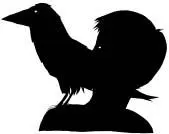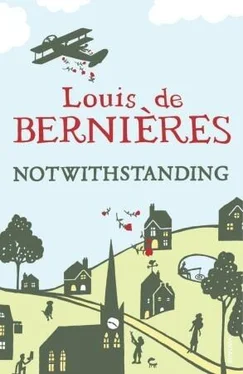Jenny took his name and number, and duly rang the vendor, who seemed quite distressed. ‘Oh no,’ she said. ‘Oh no. I don’t think I’ve still got the receipt. I got it last year, and then I never played it. I’ve no idea where the receipt is.’
‘Well, I’m sorry, madam, you’ll have to come in and get it. We can’t buy instruments without one. Have you any idea when you can come by?’
‘Well, I have an appointment for the optician’s tomorrow at twelve, so I can come at about half past. Is that all right?’
‘That’ll be absolutely fine,’ said Jenny. She put down the phone and then picked it up again, leaving a message for the policeman at the station. The young man played the first bar of ‘Stairway to Heaven’, and Jenny put her fingers in her ears. ‘Only joking,’ he said, putting the guitar back on the wall.
‘I suppose you want a D string,’ said Jenny.
‘A whole set this time,’ he said. ‘I’m feeling rich.’
The following morning the policeman was in the shop, and the clarinet was on the counter when the woman came in. She looked at the policeman, and then at Jenny. The policeman said, ‘Is this the lady concerned?’ and Jenny nodded and said, ‘Yes.’
The policeman addressed her. ‘Madam, I have reason to believe that you may be in possession of stolen property, namely this here clarinet, and that you may be committing an offence by trying to sell it.’
The woman’s reaction was surprising. She began to laugh.
‘Madam, this is serious,’ said the policeman. ‘This is no laughing matter.’
‘It is! It is!’ said the woman, sitting down abruptly on the stool normally occupied by guitarists. She snorted with laughter, and began to fumble in her handbag.
‘Madam, you must stop laughing,’ said the policeman.
The woman said, ‘You think it’s me? Me selling stolen property? Me? Me? Oh that’s rich! Oh dearie me, how funny.’ She sat and giggled, fumbling in her bag until she brought out a note. ‘I found the receipt,’ she said, handing it over.
Jenny took it and handed it to the policeman. Together they looked at it. It read: ‘One Buffet RC clarinet, sold at auction.’ At the top of the notepaper was stamped ‘Guildford Police Auction’.
‘Oh Christ on a bicycle,’ said the policeman.
After the policeman had gone, Jenny apologised to the woman, and they laughed about the incident together.
‘The look on his face!’ said Jenny. ‘It was priceless! His ears went red!’
‘Does this mean I can sell the clarinet?’ asked the woman. ‘Only, I bought it last year, thinking I was going to make the effort, but I never got round to it, and now this wonderfully good flute has come up. I need the money. I couldn’t bear it if someone else got the flute. It was designed by Marcel Moyse. It’s got funny little platforms all over it, to rest your fingers on.’
‘You’re a flautist?’ asked Jenny. ‘Are you local? Are you mad, and do you play out of tune and breathe in the wrong places? Do you have much spare time? Do you play with anyone? Have you got children? I’m Jenny, by the way. I’m an oboist.’
‘An oboist? And you’re asking me if I’m mad?’
‘Look, it’s lunchtime. I’m off in a minute. Why don’t we go and have a baked potato at Fleur’s?’
‘Just steer me away from Record Corner,’ said the woman.
‘Oh, me too,’ said Jenny, ‘don’t let me go near it,’ and they hid their faces in their hands as they passed the Lloyds Bank at the corner of Pound Lane.

IT IS SPRING, when the Surrey countryside is burgeoning extravagantly with new life. There had seemed to be almost no wood pigeons during the winter, but now, unaccountably, there are entire flocks of them in the fruit trees and on the lawn. The tumescent grass grows up behind the mower even as it mows. The cat brings in two baby rabbits a day, and crunches them down like carrots, head first. By the end of the day only two cotton tails and two green bags are left, but the cat is still demanding its usual ration of Felix and biscuits. The pheasants that have survived the last season’s holocaust strut ridiculously in the orchard, the males engaging in combat, while the females wait to be covered. The voice of the turtle is heard again in the land, but for the last time, because the turtle doves will not come again in subsequent years. They are exterminated pointlessly but systematically by the Maltese while en route from Africa.
The fruit trees clothe themselves in frothy pinks and whites, as if for a wedding with the summer. Bluebells burst from the floor of the woodland, and nettles and Jack-by-the-hedge overwhelm the ditches. The air is heavy with the rich whorehouse smell of lilac. Flies come out of hibernation in the window frames, and desiccate on sills.
Amid this grotesque natural prodigality, death pokes about with a stick. A young sparrowhawk lies dead at the edge of the field. Robert picks it up and thinks it is the most beautiful thing he has seen since the day that he landed the Girt Pike. A thrush falls from its nest and expires in the brambles below. A barely fledged pigeon falls directly in front of a foxhole. Two moorhens disappear from the village pond. The road is scarlet with gory pancakes that had once been rabbit kittens and hedgehogs. A baby fox is lost, and the Major slows down carefully, as does Polly Wantage, but not long afterwards it is run down by one of the nuns from the convent, whose mind is obliviously on higher things. The hedging and ditching man offers her the consolation of his philosophy, and promises that he will bury the little corpse, but after she has driven on he picks it up by the tail and swings it into the trees behind Mrs Mac’s house, where it is gourmandised by rats. The General’s dog, Bella, finds the body and rolls in it, so that she has to be exiled to the garden shed until the stench wears off.
Spring, ambiguous equally in beauty and horror, bears in on Robert. Everyone knows that he can’t help looking after young or wounded birds, and he and his Uncle Dick have even knocked up a little bird hospital in the garden, made of one-by-two and chicken wire. So it is that John the gardener, who works on the Shah of Iran’s stud farm in Munstead and who lives in one of the other council houses near the Institute of Oceanography, comes round one evening, cupping something black and fluffy in his hands.
‘The dog brought this in,’ he says to the young boy. ‘I put it back out so ’at its mother could come for it, but then the dog brought it back in again, and I thought it might be yours.’
Robert is puzzled. ‘Why would it be mine?’
John says, ‘Well, it is now, boy.’ He advances it, and Robert takes it carefully. It is a young rook, with a full-sized head, a small body and a very short stumpy tail. ‘It’s half fledged,’ says John. ‘I reckon you should be able to do something with it. It’s not scared at all. Good sign, that is.’
‘I had a pet jackdaw once,’ says Robert.
‘Same idea, this is,’ says John, ‘except different.’
‘Thank you,’ says Robert, and takes the bird indoors.
‘Oh, not another one,’ says his mother insincerely, glancing up from the sink, where she is scrubbing the green rings off the flowerpots.
‘I’ve never had a rook before,’ says Robert, in self-justification.
‘Must be from the elms behind the water tower,’ says his mother. The water tower is a notorious local landmark. It is distinctly phallic, especially now that it has been painted pink. Nearby are elms that have been a rookery for a hundred years. ‘Maybe you should take it back there and let the mother find it.’
Читать дальше













